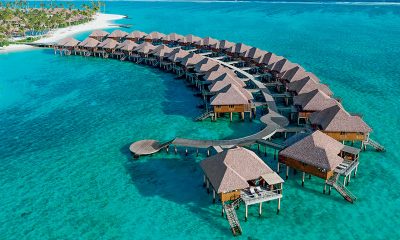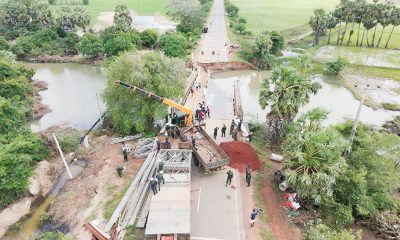Life style
Amphibians going extinct in SL at a record pace

by Ifham Nizam
Sri Lanka holds the record for nearly 14 per cent of the amphibian extinctions in the world. In other words, of the 130 amphibian extinctions known to have occurred across the globe, 18 extinctions (14 per cent) have occurred in Sri Lanka, says Dr. Anslem de Silva, widely regarded as the father of Herpetology in the country. Speaking to The Sunday Island, the authors of a news book on amphibians, said that this is one of the highest number of amphibian extinctions known from a single country. Some consider this unusual extinction rate to be largely the result of the loss of nearly 70 per cent of the island’s forest cover. Dr. Anslem de Silva, Co-Chairman, Amphibian Specialist Group, International Union for the Conservation of Nature/Species Survival Commission (IUCN/SSC), together with two academics, Dr. Kanishka Ukuwela, Senior Lecture at Rajarata University, Mihintale who is  also associated with IUCN/SSC and Dr. Dillan Chaturanga, Lecture at Ruhuna University, Matara had authored this most comprehensive book on amphibians running to nearly 250 pages released last week. The prevalent levels of application of agrochemicals up to few months back, especially in rice fields, and vegetable and tea plantations, have increased over the past three decades. Similarly, the release of untreated industrial wastewater to natural water bodies has intensified. As a consequence, many streams and canals have become highly polluted, they say. The use of pesticides directly decreases the insect population, an important source of food for amphibians. Furthermore, these pollutants can easily make the water in paddy fields and the insects on which the amphibians feed toxic or increase the nitrogen content of the water. The highly permeable skins of amphibians would certainly cause them to be directly affected by these, they add. Amphibian mortality due to road traffic is a widespread problem globally that has been known to be responsible for population reductions and even local extinction in certaininstances. In Sri Lanka, amphibian mortalities due to road traffic are highly prevalent on roads that serve paddy fields, wetlands and forests. Further, they are especially intensified on rainy days when amphibian activity is high, the book explains. Recent studies indicate that amphibian road kills are exacerbated in certain national parks in the country due to increased visitation. According to recent estimates, several thousand amphibians are killed annually due to road traffic.
also associated with IUCN/SSC and Dr. Dillan Chaturanga, Lecture at Ruhuna University, Matara had authored this most comprehensive book on amphibians running to nearly 250 pages released last week. The prevalent levels of application of agrochemicals up to few months back, especially in rice fields, and vegetable and tea plantations, have increased over the past three decades. Similarly, the release of untreated industrial wastewater to natural water bodies has intensified. As a consequence, many streams and canals have become highly polluted, they say. The use of pesticides directly decreases the insect population, an important source of food for amphibians. Furthermore, these pollutants can easily make the water in paddy fields and the insects on which the amphibians feed toxic or increase the nitrogen content of the water. The highly permeable skins of amphibians would certainly cause them to be directly affected by these, they add. Amphibian mortality due to road traffic is a widespread problem globally that has been known to be responsible for population reductions and even local extinction in certaininstances. In Sri Lanka, amphibian mortalities due to road traffic are highly prevalent on roads that serve paddy fields, wetlands and forests. Further, they are especially intensified on rainy days when amphibian activity is high, the book explains. Recent studies indicate that amphibian road kills are exacerbated in certain national parks in the country due to increased visitation. According to recent estimates, several thousand amphibians are killed annually due to road traffic.
Professor W. A. Priyanka, PhD (USA), Professor in Zoology, Faculty of Science, University of Peradeniya says the need for a guide to the amphibian fauna of Sri Lanka is obvious, given the currently critical conditions endangering them. Amphibians are an attractive group of animals whose diversity has always sparked interest among the scientific community, creating a vast body of unanswered questions.However, the identification of amphibians has been a challenge due to the lack of a complete and informative guide. The comprehensive pictorial guide provided by the new book should thus be of great benefit to a better understanding of the unique and intriguing nature of these fascinating living beings.The authors have done an outstanding job in compiling this book. An introduction to the guide briefly describes the history, current status, threats and conservation information, along with interesting folklore associated with amphibians. With the clear and informative images, distribution maps and updated status of each species, this guide can easily be comprehended by experts and beginners in the field alike.”I firmly believe that this book will be very useful to undergraduate and postgraduate students in the fields of zoology, biology and environmental science, as well as researchers, wildlife managers and visitors,” Professor Priyanka added.The authors said that like their previous guide to the reptiles of Sri Lanka, A Naturalist’s Guide to the Reptiles of Sri Lanka (de Silva & Ukuwela, 2017, 2020), this book is intended for both naturalists and visitors to Sri Lanka, providing an introduction to the amphibians found here. It features all the extant species of amphibian in this country with colour photographs and quick and easy tips for identification. At the time of writing, 120 species have been recorded within the country and ongoing taxonomic work is certain to add more to this impressive list in the next few years.This guide provides a general introduction to the amphibians of Sri Lanka, a profile of the physiographic, climatic, and vegetation features of the island, key characteristics that can be used in the identification of amphibians and descriptions of each extant amphibian species.Additionally, it presents information on amphibian conservation here and a brief introduction to folklore and traditional treatment methods for combating poisoning due to amphibians in this country. The species descriptions are arranged under their higher taxonomic groups(orders and families), and further grouped in their respective genera.The descriptions are organized in alphabetical order by their scientific names. Every species covered is accompanied by one or more colour photograph of the animal. Each account includes the vernacular name in English, the current scientific name, the vernacular name in Sinhala, a brief history of the species, a description with identification features, and details of habitat, habits and distribution (both here and outside the country).Key external identification features of the species, such as body form, skin texture and coloration, are provided, to help in the quick identification of an animal in the field.It must be noted that according to Sri Lanka’s wildlife laws, amphibians cannot be captured or removed from their natural habitats without official permits, which must be obtained in advance from the Department of Wildlife Conservation.Sri Lanka is home to an exceptional diversity of amphibians. Currently, the island nation boasts of 112 species of amphibians of which 98 are restricted to the country. However, nearly 60 per cent of this magnificent diversity is threatened with extinction. To make matters worse, very little attention is paid by the conservation authorities or the public. The last treatise on the subject was published 15 years ago. However, many changes have taken place since then and hence an updated compilation was a major necessity. This book by the three authors intends to popularize the study of amphibians by the general public by filling this large void. Historical aspects
Sri Lanka is one of the few countries in the world where conservation and protection of its fauna and flora has been practiced since pre-Christian times. There is much archaeological, historical and literary evidence to show that from ancient times amphibians have attracted the attention of the people of this island.
This is evident by the discovery of an ancient bronze cast of a frog (see photo) discovered during excavations conducted by the Department of Archaeology and the Central Cultural Fund. Strati-graphic evidence from the excavation sites indicate that these objects belong to the sixth to eighth centuries AD (Anuradhapura and Jetavanārāma museum records). Beliefs that feature the ‘good’ qualities of frogs and association with nature. These beliefs have some positive effects on the conservation of amphibians, perhaps one reason that Sri Lanka harbours a diverse assemblage of frogs. Absence of frogs and toads in agricultural fields indicates impending crop failure, it is believed.
The authors have specially thanked Managing Director John Beaufoy of John Beaufoy Publishing Ltd, for publishing many books promoting Sri Lanka diversity.
Life style
Aslam Hussein’s Couture and Trousseau

 At Colombo Fashion Week,held recently at Cinnamon Grand,designer Aslam Hussein delivered a collection that spoke the language of quiet confidence and refined glamour, positioning him firmly as a Fashion Edit, favourite this season.
At Colombo Fashion Week,held recently at Cinnamon Grand,designer Aslam Hussein delivered a collection that spoke the language of quiet confidence and refined glamour, positioning him firmly as a Fashion Edit, favourite this season.
‘His collection unfolded like a carefully composed symphony – each piece moving with a rhythm of elegance and poise. Aslam Hussein’s runaway was more than a presentation – it was a story of refined luxury, individuality and timeless beauty where couture met emotion and each garment became a living expression of artistry.
Colombo Fashion Week was held this November at Cinnamon Grand ,namely Couture + Trousseau . The event was part of the luxury edit focused on high fashion,bridal wear and destination wedding,celebrating CFW’’s 22 rd anniversary Aslam Hussein opened the runway and his collection balanced sharp tailoring with fluid silhouettes, creating looks that felt both modern and enduring. Clean lines, thoughtful construction and an understated palette allowed craftsmanship to take centre stage. The colour palette was muted yet rich, allowing texture and craftsmanship to speak. Luxurious fabrics caught the light with every step, revealing subtle interplay between movement and form. Each silhouette told a story of – timeless, modern and effortless elegance
Fluid silhouettes, muted palettes and clean tailoring defined his collection.
On the ramp,models moved with understated confidence, their hairstyles were created by. Ramani Fernando salons,the soft luminous makeup complemented the collection’s quiet sophistication. Each silhouette reflected Aslam’s commitment to craftsmanship, versatility and timeless style. Since establishing his label, he has been a staple on Sri Lanka’s fashion calendar, consistently presenting at Colombo Fashion Weeks and earning recognition for his designs.
His collection this year re-affirmed his mastery of understated elegance and contemporary luxury. Neutral tones were punctioned with occasion, deep shades, allowing fabric, cut and texture to take centre stage. Models carried the collection with measured poise. Make up was luminous yet natural, letting the silhouettes and individual model presence shine. Through his designs, Aslam Huseein has cultivated a following among modern cosmopolitan clientele who appreciate understated glamour, versatility and the quiet power of elegance.
His contributions have solidified his reputation as a designer who bridges Sri Lanka’s rich fashion heritage with an international sensibility.
Colombo Fashion Week is Sri Lanka’s premier event, showcasing the country’s top designers alongside emerging talent and is one of the glamorous events in the fashion landscape. The visionary is Ajay Vir Singh, founder of Colombo Fashion Week, whose leadership continues to elevate Sri Lanka’s premier fashion platform to international level.
Life style
Hairstyle maestro: Niroshan at Ramani Fernando salon at Mount Lavinia

Ramani Fernando salons is a name that has taken men and women’s grooming to new heights since its inception at Mount Lavinia. The salon has made its mark on the locals and celebrities alike. Over the years, Ramani Fernando Salons has not just set a benchmark for luxury grooming services but has also redefined how men perceive self-care, hair styling, and professional grooming. This salon at Mount Lavinia under its Manager Kappitiya Godage, namely Niroshan known by clients has become a favourite destination for those who sought more than just a haircut. The salon introduces a range of services—from precision styling and beard grooming to men’s makeup for photoshoots. The manager at Mount Lavinia is Niroshan Suresh. His philosophy emphasized that grooming is not just about appearance but also about confidence and self-expression and most importantly – self-care. He says make-up and grooming are not just limited to the opposite gender!
What makes Ramani Fernando Salon at Mount stand out. It is its innovative style and technique to men and women’s grooming. This branch prides itself on using cutting-edge tools and premium products that ensure every client leaves with a polished, customized look. The salon focus is on continuous learning and staying ahead of trends has earned it the loyalty of a discerning clientele.
Working at Ramani salons, Niroshan has spent many years perfecting the craft of styling, cutting and grooming men’s and woman’s hair, blending technical skill with a keen understanding of contemporary fashion trends. With years of experience, he guides clients on hairstyles and on the selection and proper use of styling products. His presence at Ramani Fernando salon at Mount Lavinia reinforce the brand’s reputation for excellence but also highlights the vital role of a skilled male stylist in shaping men and women’s grooming culture in Sri Lanka.
In the evolving world of men’s grooming, where style isn’t just about guiding a haircut but crafting a confident identity Niroshan at Mount Lavinia represent more than just a stylist or a place to cut hair. With Niroshan at the helm, this salon has become a place where style, innovation and meticulous grooming are curated for any client who walks in.
He is part of Ramani Fernando salons creative team, and brings creativity and precision to every look reflecting the high standards of Ramani Fernando’s renowned beauty collection
Niroshan has been with Ramani Fernando for several years and he is popular among his clients for those seeking sharp, modern and personalised hairstyles. With many years of experience, he has combined technical expertise with an eye for current trends ensuring each client leaves the salon looking confident and polished, Niroshan begins with a consultation, he carefully considers face shape, hair texture and personal style before recommending a look: He tailors each style to suit individual preferences, while ensuring easy to maintenance.
Beyond haircuts and grooming, his services include beard shaping, scalp and hair treatments and guidance on styling products. He makes each client of his leave the salon not just with a haircut but walk with confidence. He enjoys seeing his clients happy and self-assured. His experience, professionalism and knowledge make him a standard stylist in Colombo’s competitive grooming scene. He is very grateful to his senior and dynamic hairdresser Kamal for his guidance and expertise and who has been instrumental in shaping his approach to styling and artistry
by Zanita Careem ✍️
Life style
The Kingsbury, Colombo, Welcomes Season of Splendour

The Kingsbury, Colombo, welcomes the festive season with a spirit of warmth, elegance and celebration. This year’s Christmas and New Year offerings have been curated to bring guests together through moments of comfort, connection and shared joy across the hotel.
Harbour Court sets the tone for the season with its Christmas Eve Dinner Buffet, Christmas Day Brunch and Christmas Dinner on 24th and 25th December, followed by the New Year’s Eve Dinner Buffet on 31st December and the New Year’s Day Lunch and Dinner Buffets on 1st January. Kings Steakbar brings festive fine dining to Colombo with its Sunday Gourmet Carvery every Sunday in December, the Christmas Gourmet Carvery on 24th and 25th December, an á la carte Christmas Dinner on Christmas Day and a Seven-course Gourmet Dinner on New Year’s Eve.
Yue Chuan offers authentic Chinese cuisine with its signature Peking Duck Experience throughout December, daily Dim Sum and a special All You Can Eat menu on 24th, 25th and 31st December. At Tenk?, guests can enjoy elegant Japanese cuisine with the daily Teppanyaki Show, festive á la carte menus on 24th and 25th December and a New Year’s Eve Tasting Menu. Ocean highlights the best of coastal cuisine with festive á la carte menus on 24th, 25th and 31st December. Bringing Sri Lankan authenticity to the season, Tavern presents an Arrack Tasting Experience throughout December.
Festive cheer continues outdoors at Honey Beach Club with live music from 19th to 23rd December, poolside Festive party packages, and the signature New Year’s Eve celebration “Dancing Into 2026,” featuring Infinity and DJ E2. At Sky Lounge, guests can enjoy elevated festivities with Corporate Celebration packages, festive set menus, seasonal cocktails and the New Year’s Eve event “Party in the Sky,” featuring The Kingdom. Seas
For those celebrating at home, The Kingsbury offers Seasonal Roasts and festive hampers, available both ready-made and customisable, while Indulgence provides five-star delivery throughout the season. Families can also enjoy special offers, with children below six dining free and children aged six to ten receiving 50% off buffet dining. Seasonal cocktails, wine menus and bottle deals are available across all outlets.
This year, The Kingsbury, Colombo, invites guests to embrace the season with kindness, hope and cherished moments. Whether dining out, gathering with loved ones or gifting thoughtfully, we are honoured to share a season of splendour with you.
-

 News4 days ago
News4 days agoMembers of Lankan Community in Washington D.C. donates to ‘Rebuilding Sri Lanka’ Flood Relief Fund
-

 News2 days ago
News2 days agoBritish MP calls on Foreign Secretary to expand sanction package against ‘Sri Lankan war criminals’
-

 Business6 days ago
Business6 days agoBrowns Investments sells luxury Maldivian resort for USD 57.5 mn.
-

 News5 days ago
News5 days agoAir quality deteriorating in Sri Lanka
-

 News5 days ago
News5 days agoCardinal urges govt. not to weaken key socio-cultural institutions
-

 Features6 days ago
Features6 days agoHatton Plantations and WNPS PLANT Launch 24 km Riparian Forest Corridor
-

 Features6 days ago
Features6 days agoAnother Christmas, Another Disaster, Another Recovery Mountain to Climb
-

 Features4 days ago
Features4 days agoGeneral education reforms: What about language and ethnicity?

















